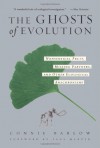Currently reading
Cristofori's Dream
Your Inner Fish: A Journey Into The 3.5 Billion Year History Of The Human Body
The Enchanted Wood
The Sparrow
The Ghosts Of Evolution Nonsensical Fruit, Missing Partners, And Other Ecological Anachronisms
Under the Greenwood Tree
 This was Thomas Hardy's 2nd published novel. He apparently destroyed the manuscript of his first written novel because the subject was too controversial. The results was this boring novel which follows the pursuit of a man for a woman he seems to have fallen for on sight alone. I wished desperately she'd reject him or something would keep them apart in the end.
This was Thomas Hardy's 2nd published novel. He apparently destroyed the manuscript of his first written novel because the subject was too controversial. The results was this boring novel which follows the pursuit of a man for a woman he seems to have fallen for on sight alone. I wished desperately she'd reject him or something would keep them apart in the end. It's interesting having read some of Hardy's last novels first and then skipping to the beginning of his career. In this one, you can see the influence of Charles Dickens on his early writing style and character development. I'm glad he grew into his own style with time and eventually decided not to hold back what he wanted to say.
I'd heard this was a more "pastoral" book, but apart from a few metaphorical descriptions of nature, it's not of a pastoral nature.
I can see where Hardy wanted to take this book, but his social commentary is far too weak here to make this the book it could have been. I'm glad, though, that he built up momentum with his subsequent works.
I'd not recommend this book for more than its scholarly appeal to those wanting to read all of Hardy's works. But someone managed to squeeze a movie out of this thin plot, so maybe my problem with the novel is partly expecting more from Hardy.
Life After Life
 When I first heard of the premise of this book, I like so many others, was instantly keen to read it. What would happen if a person had to repeat the same life over and over until they got it right? This idea has the potential for greatness. Unfortunately, the young lady of many lives in this story, Ursula, has no discernible personality. She’s an empty vessel that empties out over and over, leading the same boring life over and over with minor variations. The only excitement happens when she entangles herself with abusive men (the only people besides Izzie with any glimmer of a personality in the whole book). And even those entanglements are too short-lived to be interesting. Just when you think the story is going to take a turn for the interesting, the plot line fizzles out. I would suggest that if you read Ursula’s first 2 or 3 lives and find yourself bored with them, it’s not going to get better. Just put the book down quietly and run far, far away from it. The ending is as anticlimactic as the book (if one could actually call it an ending). Don't be fooled by the blurb that says that the "fate of civilization" rests in her hands. It doesn't.
When I first heard of the premise of this book, I like so many others, was instantly keen to read it. What would happen if a person had to repeat the same life over and over until they got it right? This idea has the potential for greatness. Unfortunately, the young lady of many lives in this story, Ursula, has no discernible personality. She’s an empty vessel that empties out over and over, leading the same boring life over and over with minor variations. The only excitement happens when she entangles herself with abusive men (the only people besides Izzie with any glimmer of a personality in the whole book). And even those entanglements are too short-lived to be interesting. Just when you think the story is going to take a turn for the interesting, the plot line fizzles out. I would suggest that if you read Ursula’s first 2 or 3 lives and find yourself bored with them, it’s not going to get better. Just put the book down quietly and run far, far away from it. The ending is as anticlimactic as the book (if one could actually call it an ending). Don't be fooled by the blurb that says that the "fate of civilization" rests in her hands. It doesn't.Now, there are plenty of people who like this book. Perhaps they have a higher tolerance for prolonged boredom than I do. Or perhaps their fascination with the idea behind the novel kept up enough magic for them to enjoy it in all its 529-paged glory. I personally found it a chore to read and actually developed a phone game habit as an excuse not to read it. Yeah, I liked it that much. It took me over a month to finally kill the thing. And still Ursula lives on. Die and stay dead already.
I’d love to read a book created with this idea in mind by an author with more imagination. I’d love to see this idea written by someone who writes strong characters and who could write each life to be wildly different than the life before it. It’s a 5-star idea that needed a 5-star writer to do it justice.
Beautiful Wreck
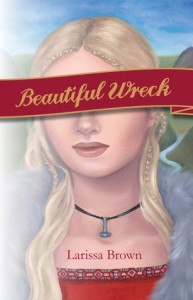 Every now and then you encounter a book that you know will be an amazing book from the very first page. This is such a book.
Every now and then you encounter a book that you know will be an amazing book from the very first page. This is such a book.A meadow would have been lovely. I’d come into the tank every day if I could feel lush, slippery grass between my toes, the gentle nudge of a breeze at my frothy hems. But the programmers couldn’t accomplish the immense reach and power of outdoor scenes. Not yet.
I keep trying to put my finger why I knew that this would be a 5-star book from the start, and I think that it’s the lyrical, personal nature of the book. The author’s writing is gorgeous and lush (to borrow from the quote). The settings of Future Iceland and Viking Iceland come alive in your mind as you read. Future Iceland is crowded, highly synthetic, and derives its pleasure from virtual reality. And this makes Viking Iceland, where Jen accidentally finds herself in the flesh rather than in a simulation, seem more real than the world from whence she came.
As another reviewer has said, I don’t normally read romance novels, but if they were all as well-written and researched as this one, I’d give them much more consideration. The fact that Jen/Ginn and the Viking she loves can never be together or even touch creates an extreme form of romantic tension for the story. Even more, the author has created quite a conundrum of a character for Jen to love. He’s fire and ice, water and sun. He smells intoxicatingly of fire, leather, furs, cinnamon. And he speaks with “[t]he sparsest poetry on his lips.” “Gods," Jen says, “what would it feel like to kiss?” Indeed. I wanted to know and hoped Lofn would truly clear the way for impossible unions, for these two who want nothing more than to care for each other in small daily moments. “It is hard, Litla,” he says to Jen. “To be so close, and stay away from you.” Always “[n]othing made sense,” she thought. “He wouldn’t touch me, but he couldn’t let me go. Even as he admitted his desire, he took it away.” Ah, forbidden love, how you do sting.
Even the trees are sexy in this book: “a thousand wisps of papery bark curled to reveal blush and orange and copper under the trees’ white skins.” ...And the eyelashes: “[w]hen I lowered my eyelashes I felt every one as a miniature icicle, melting into dew around my eyes.” ...And, of course, the thoughts: “I want forbidden things, thoughts with dark wings, bodies slick with sweat.” Já.
I’m curious to see how male readers will react to this novel. At it’s heart, it’s a historical time travel novel in a gorgeous setting. It’s not a heavy-breathing and constant quivering romance novel. After all, there’s a universal pain to be felt in forbidden love. And there’s plenty of sheep shearing and Vikings cutting off hands and such.
To start the year reading the best book I’ll probably read all year … maybe all decade … means that I can’t easily pick up the next book. It won’t be rolling green or fluffy white Iceland. It won’t be a gorgeously written book about forbidden love in an impossible past. It won’t be this book.
Do yourself a favor and read this book when it come out in early February. Just one warning: when you do, you'll find yourself still up reading at 3 a.m. And for breathtaking visuals that will leave you wanting more, visit http://www.pinterest.com/larissabrown/viking-love/.
Desperate Remedies (Penguin Classics)
 Thomas Hardy’s first book was rejected by publishers because the plot went nowhere. The plot certainly went somewhere with his second book and first published novel, Desperate Remedies. Considering how many of Thomas Hardy’s novels were made into movies, I’m surprised that this one wasn’t. He’s built a very strong cast of characters. The heroine is strong and rational while the villain is dastardly indeed. The tale is one part mystery and one part love triangle. I’d even go as far as to call it gothic. This is the first time I’ve read anything by Hardy remotely approaching gothic, and I quite enjoyed it.
Thomas Hardy’s first book was rejected by publishers because the plot went nowhere. The plot certainly went somewhere with his second book and first published novel, Desperate Remedies. Considering how many of Thomas Hardy’s novels were made into movies, I’m surprised that this one wasn’t. He’s built a very strong cast of characters. The heroine is strong and rational while the villain is dastardly indeed. The tale is one part mystery and one part love triangle. I’d even go as far as to call it gothic. This is the first time I’ve read anything by Hardy remotely approaching gothic, and I quite enjoyed it.After the untimely deaths of their parents, two young adults go out into the world together to try to fend for themselves. The brother tries to find a job related to his architectural studies while the sister, Cytherea, looks for a position as a lady’s maid. As fate would have it, Cytherea accepts a position in the home of a lady whose past is closely connected to that of Cytherea’s family.
Two men vie for Cytherea’s attention, but she finds herself not trusting either of them. The first tries to kiss her in a row boat and the second creeps her out by drawing her into his house during a thunderstorm and playing his organ for her. No, this is not a euphemism. And, no, he doesn’t actually know how to play an organ (this sounds strangely like a bad date I once had). She eventually finds out both of these overly-forward guys have dirty secrets and feels justified in her contentment to stay single. I was quite happy to find that Cytherea has her head on straight enough to initially steer clear of these guys. She wisely heeds the advice that her father gives at the beginning of the book: “don't love too blindly: blindly you will love if you love at all, but a little care is still possible to a well-disciplined heart.” It’s too bad we can’t all learn from the mistakes of others as well as Cytherea has. “Scheme to marry? I'd rather scheme to die!” she says. Yet, she has her own lessons to learn.
Unfortunately, because of her brother’s failing health, she eventually finds herself pressured to marry to avoid sending her brother to a county hospital. Oh the horror. I found it very infuriating that the brother insisted that his sister marry for money when he knew it would cause her a life of sadness simply because he didn’t want to take the chance he might lose a limb at the county hospital. I can’t imagine asking someone to sacrifice the happiness of their entire life for the sake of my limb. But that’s what brothers are for, right?
The last part of the book is fast-paced as you try to determine if your suspicions are correct about the dark secrets various characters may be harboring. There are a few clues along the way. Unfortunately, I read one of the biggest secrets -- one that’s only revealed in the last few pages -- in a synopsis for this book somewhere online. In a way, it was interesting to read the book through that lens, but I would have rather not have had it spoiled for me. Still, that was not the most surprising of gothically delectable revelations.
I think that my favorite quote in the book is from a man who is doomed to imminent death. He says, “I am now about to enter on my normal condition. For people are almost always in their graves. When we survey the long race of men, it is strange and still more strange to find that they are mainly dead men, who have scarcely ever been otherwise.” I can’t seem to forget this statement in the few days since I read it. It’s caused myself to marvel daily that I’m alive now in the whole history of the universe. That statement, like Carl Sagan’s “Cosmic Calendar”, reveals so much of how infinitesimal man’s existence is in the universe.
Hardy has a way of taking situations and twisting them to the breaking point in his plots. His characters are interconnected in such deliciously complicated ways. But so much of it is bound up in the laws or in the societal expectations of the time. It’s like how we read a book from a couple of decades ago and think how everything would be far less complicated with a cell phone. With Hardy, everything would be far less complicated if the characters weren’t worried about what the Joneses thought or if they could easily get a divorce without social ostracism.
One curious scene in the book appears to be homoerotic in nature. In general, Hardy’s later books expose the failings of Victorian cultural norms and the complications that they create for people. But this seems to be a different beast altogether. Either the scene is written innocently or its written as a bit of Victorian spite. I can’t seem to find anything on the subject other than that, when Queen Victoria was asked why there weren’t any laws against female homosexuality, she replied that women don’t do that sort of thing. So, was Hardy trying to say that they indeed did or was he really just writing an innocent scene? I would posit that it’s the former since he was made to change the scene in later editions to call the affections something akin to “motherly love”. I don’t buy it. If the Queen thinks that lesbianism doesn’t exist, you can write about it to your heart’s content with impunity.
I can very well see how this book helped to launch Hardy’s future success. It’s a close second so far among the books of his I’ve read (my favorite so far being Two on a Tower). I highly suggest it for anyone interested in reading something by Hardy, especially if they like a book that’s more on the dark side.
Second Sight
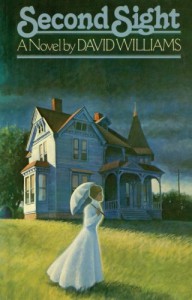 I only read this because it was a book club pick for the Time Travel group and the male moderators let it default to the female moderator since it's a time travel romance.
I only read this because it was a book club pick for the Time Travel group and the male moderators let it default to the female moderator since it's a time travel romance. Uh.
Books like this are the reason I always have to justify reading or liking a romance. The love story here is based on nothing. Their mysterious attraction is never explained. The method of time travel doesn't make much sense.
Anyhow, I don't feel like bothering with a real review. The twisty ending brings it up from 2 stars to 2.5 stars, but I'm going to have to round down since 3 star books are merely "meh" while this one was a firm "bleh".
Shedding Sadness
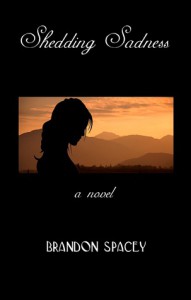 It’s been more difficult than normal for me to write this review because the characters have made me a tad nostalgic for some of my old friends … the type that make you feel good about yourself because they like and enjoy you because of (rather than in spite of) your little quirks. On the surface, this is the story of a man who gets more involved in helping a woman change her identity than he planned. But at its very heart, this is the story of getting to know people, learning to love them in spite of their faults (or stench as the case may be), learning to love their eccentricities, and how far we will go to help or protect those in whom we believe.
It’s been more difficult than normal for me to write this review because the characters have made me a tad nostalgic for some of my old friends … the type that make you feel good about yourself because they like and enjoy you because of (rather than in spite of) your little quirks. On the surface, this is the story of a man who gets more involved in helping a woman change her identity than he planned. But at its very heart, this is the story of getting to know people, learning to love them in spite of their faults (or stench as the case may be), learning to love their eccentricities, and how far we will go to help or protect those in whom we believe.Something that makes this story more profound to me is its connectivity with the memory of someone the author lost. As a tribute, it’s beautiful. The sad parts are heartbreaking, but they don’t overwhelm the beauty of the relationships that Richie develops with Sadie/Ambre and Casey. Relationships can be beautiful in their moments of “becoming”. They are beautiful in their moments of laughter as well as in their moments of chaos. Sometimes even connections that we make with someone only temporarily can have a lifetime of impact. How much are we willing to give of and give up of ourselves for those moments? Richie makes drastic choices for a stranger that could negatively affect his entire life, but he doesn’t look back. It’s a rare person who would be willing to change their own identity and lose everything they’ve worked their entire life for just to help someone who is running from unknown pursuers. I have a hard time understanding that type of sacrifice beyond the child/parent bond, but maybe I’m just selfish.
At the heart of Spacey's novels is always the depth of his characters. Sometimes you like them, and sometimes you loathe them, but you always enjoy them. This particular book is mainly full of the enjoyable type. You'll fall in love with Sadie when she sneaks items into her purchase hoping that Richie won't notice and when she botches Richie's new name. You'll fall in love with Casey when she can't manage a gun and when she makes up fake cuss words. And you'll fall in love with Richie because he finds the girls' quirks cute and because he can get away with his flirtations without getting decked. But there's also a heavy sense of realism where bad things happen and the characters really do have to spend some time to mentally come to terms with their situations rather than magically allowing it to roll off their shoulders. However, I have to chuckle because, once again, Spacey's characters are puking and pissing themselves as much as a passel of newborns. I guess it's become a trademark? Please tell me that his next book will be Bodily Fluid Lite.
Another thing you'll find in Spacey's novels that is present here in full force is a suspense that keeps you turning the pages. It's present in creative action sequences as well as in expectant romantic tension between the characters. In fact, this book has enough romantic tension to make me have to label this as a guilty pleasure type of read. I tended to enjoy this part of the book far more than the average romance that has me rolling my eyes (and far more than I'd like to admit). Why? Because the characters' interactions are interactions of bonding and endearment.
The ending kind of shocked me, but it was the perfect mix of emotion and twisty revelations. And, at the end of the night, it made me a little sad, missing various friend interactions like the ones in the book ... missing people who made me feel good about myself simply because they liked my quirks or because we had adventures together. Granted, they weren't adventures in missile silos like these guys have, but we can't all be being chased by unknown government organizations, can we?
P.S. Spacey is currently giving away a couple of copies of this book. Go to the book's main site to find the link to enter.
Under the Banner of Heaven: A Story of Violent Faith
 One thing I’ve noticed about Krakauer books is that I always feel as if the author wrote all the subjects for the book on index cards, threw them up in the air, collected them, and then shuffled them before writing. He seems to write a chapter based on one particular interview or idea rather than writing chronologically or logically. As such, it becomes a little confusing as he changes gears from modern times to the distant past and back and forth in time such that someone is dead one day and alive the next. I have to wonder if his editor pussyfoots out of the editing process just because the author has an interesting story to tell that the editor knows will sell … and because he’s Krakauer? I actually downloaded this audiobook from my library without knowing the subject and simply because it was a Krakauer book, so I guess the editor was right on that front.
One thing I’ve noticed about Krakauer books is that I always feel as if the author wrote all the subjects for the book on index cards, threw them up in the air, collected them, and then shuffled them before writing. He seems to write a chapter based on one particular interview or idea rather than writing chronologically or logically. As such, it becomes a little confusing as he changes gears from modern times to the distant past and back and forth in time such that someone is dead one day and alive the next. I have to wonder if his editor pussyfoots out of the editing process just because the author has an interesting story to tell that the editor knows will sell … and because he’s Krakauer? I actually downloaded this audiobook from my library without knowing the subject and simply because it was a Krakauer book, so I guess the editor was right on that front.Under the Banner of Heaven tells the story of the Mormon faith, attempts to explain the difference between the mainstream Mormon church and the fundamentalist version of the religion, and details a violent incident carried out in the name of the fundamentalist version of the faith. A group of guys calling themselves prophets received a "prophecy" from God listing people that the prophets should kill. This book seeks to explain all the underlying reasons why these "prophets" felt that they were justified in taking on such a killing spree. However, I don't think that you can blame Mormonism for their choices. People who want to murder will find an excuse to do so no matter their religion. Maybe The Great Pumpkin would have told them to do it if they weren't Mormons. Who knows? I do think, however, that their religion did provide a catalyst and vehicle for their extreme personalities and psychoses to thrive. And I think that that is what people fear when they rail against a "fundamentalist" version of a religion. It's not everyone within the faith that they fear; it's those who take their extreme faith to more extremes than usual and those who harm others in the process.
I grew up in a fundamentalist faith, so in some ways, perhaps I understand what these men were into in some way. When you combine a logical brain with fundamentalism, you find people who look for tangible evidence of their faith. They look for signs of God confirming what's been said. They want physical evidence to justify their belief. But then it can go nutty. I spent a large portion of my childhood and all my teen years looking for hidden meaning in everything from my dreams to whether or not the next car over the ridge was red or not. I lived my life based on "prophecies" for the future. In some ways, it became crippling because every move of every day was significant. If I left home 5 minutes later than I planned, I would avoid a terrible car accident. If a person slipped up and accidentally said the name of the city I was thinking of traveling to rather than the word they meant to say, it was a confirmation that I was supposed to go there. The collision of your faith and logic can leave you "hearing from God" about the macro- as well as the microcosm of life and finding confirmation of this in something as simple as breaking open an egg to find a double yolk. In the case of these "prophets", their messages came in the form of a "prophecy" that was dictated and auto-written, and their confirmations came from "fleecing" god with if-then statements to determine whether or not they were supposed to do these horrendous things that God had seemingly told them to do. I find it terrifying that I can understand the logic of why they thought they were in the right. That I can wrap my brain around their justifications 15 years removed from a fundamentalist belief system means that you are very correct to fear extremists and crazies within fundamentalism. But who's to say that these people wouldn't have gunned down innocents in a movie theater in the name of the Joker instead of in the name of God? People who are going to do horrible things will find their reasons and justifications anywhere. However, extreme religion can certainly feed and cultivate extreme actions a lot more efficiently than stand-alone craziness can.
As for Mormonism, I learned in this book why I could never buy into it: peep stones and DNA. I never realized Joseph Smith found the famous golden tablets and other things by the use of "peep stones". I also never knew that Native Americans are supposed by Mormons to be a lost tribe of Israel. I wonder how the founding of Mormonism would go over if it happened today. Would it have gotten off to the same start in the 2000s as it did in the 1800s? Anyhow, there are plenty of belief systems I don't subscribe to, and this is one of them. To each their own. The majority of belief systems contain fantastical tales that are to taken on faith, so what's the difference between their faith and yours if you have a faith? You just choose which fantastical tales suit you, and they choose which ones they prefer.
In the end, I rated this book 2 stars because it needs serious editing. I also think that it wasn't necessarily fairly written in that it seemed to want to blame the Lafferty brothers, prophets, and company's killing spree on them being fundamentalists rather than them being just crazy. Fundamentalism might have been a contributing factor, but I felt that the author wanted to point is finger at all fundamentalists of any religion as having the potential to become these guys. I really don't think this is so, although I'd certainly fear someone who was able to rally an entire army of crazies that were also fundamentalists. I think the fear factor rises with strength of numbers.
The Many-Coloured Land
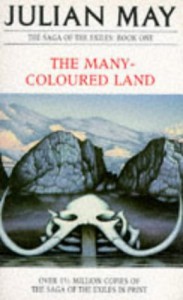 This book became an instant favorite within a few short chapters as I started to meet all the characters. I regret terribly that the author of this series doesn't want it to go to television or film, but I do understand her fear that it would not be true to the world that she created. They're all cast and mini-series-ready in my head if she changes her mind and ever wants my input.
This book became an instant favorite within a few short chapters as I started to meet all the characters. I regret terribly that the author of this series doesn't want it to go to television or film, but I do understand her fear that it would not be true to the world that she created. They're all cast and mini-series-ready in my head if she changes her mind and ever wants my input.The book starts in the future when humans have populated various planets in the universe and come to peaceful understandings with other beings in the Galactic Milleau. But, yet, even with all these planets to inhabit, there are still people who seek the ultimate escape from whatever past haunts them: exile through a one-way time portal into the pre-historic Pliocene era. People have been disappearing through the portal for 75 years when our assembled cast of characters makes its way through. One can only speculate what's on the other side.
Our characters cross over into a survival adventure journey in which the author has added just the right amount of gorgeous detail about the flora and fauna of ancient France and Germany. I actually found myself looking up vacations in the Black Forest of Germany as a result. What a stupendously beautiful area of the world.
I had to borrow the companion book for the series from the library. In it, I found an essay about the music that the author has in her head related to the series. She wrote it as an opera, and the music, which I turned into a playlist, is mainly operatic in nature: http://open.spotify.com/user/paisleymonsoon/playlist/622bqa1sKAOuU6E4A4Y7mM
One thing that bothered me a little about the series was that the author introduced what seemed like magic into what I thought was going to be a story steeped in science. But she insists that all that seems like magic really has a basis in science. I don't know that I'm completely convinced, but at least with that statement, I can go forward with a little less trepidation into the rest of the series. I could have done without the long fight scene at the end of this first book of the series, but that's just me not caring for fight scenes all that much.
I think I will have to go forward with the series, though. It's not a world that I'm ready yet to leave. And I care about what happens to the characters: Stein who dressed himself up like a Viking for the journey into the Pliocene, Stein's wine-loving pirate-dressed pal Richard, Amerie the nun, Claude the ancient paleontologist ... these are my favorites. I feel like I've become obsessed with this series more than I have with any series since The Spin Saga. But this series grabs me in a different way because it has me constantly researching references to vocabulary, music, ancient animals, topographical features, etc. And this makes the reading a much richer experience.
I think I'm going to be dreaming of Black Forest vacations for a while (but I'll probably have to settle for the cake named after it instead). Oh well, off to buy the 2nd book in the series ...
Thomas Jefferson, Rachel and Me
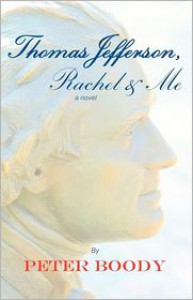 How exactly would Thomas Jefferson react to finding himself suddenly living in the 2010s? Would he embrace modern technology and today's social changes, or would he be a complete fish out of water? The exploration of this theme definitely makes for an enjoyable book. It is intelligent and has more history thrown in than the average time travel book. Actually, this seems to be one part time travel book, one part history book, and one part ghost story. At first, I wasn't sure it could be categorized as a time travel book, but Thomas Jefferson's ghost takes on corporeal form and actually lives and breathes in a time not his own. So it technically counts as time travel.
How exactly would Thomas Jefferson react to finding himself suddenly living in the 2010s? Would he embrace modern technology and today's social changes, or would he be a complete fish out of water? The exploration of this theme definitely makes for an enjoyable book. It is intelligent and has more history thrown in than the average time travel book. Actually, this seems to be one part time travel book, one part history book, and one part ghost story. At first, I wasn't sure it could be categorized as a time travel book, but Thomas Jefferson's ghost takes on corporeal form and actually lives and breathes in a time not his own. So it technically counts as time travel.Lest you think that the book be a little too serious for your tastes, I'll present you with a few choice quotes:
"I saw Thomas Jefferson naked."
"The bill came to more than $1,400. I consoled myself that it was a bargain for a meal with Thomas Jefferson."
"You should be Gooogling, Mr. Carter, "Jefferson said. "I Google, but with a healthy skepticism."
And, gosh, those quotes pretty much sum up Thomas Jefferson's personality in the 2010s: an information-thirsty,lusty man with an appreciation and need for fine things and the need for a much deeper purse than that which an unemployed ex-president with no identification actually has.
Of course, I'm sure you're curious as to what Mr. Jefferson has on his iPod, aren't you? Luckily for you, there's a playlist for that.
Trying to place Jefferson in the modern world and imagine his reaction to those things around him is certainly no easy task. I found myself wondering what his main issues would be and whether or not he would fit more into conservative or liberal politics of our day. While he was extremely liberal for his time, the author suggests that he'd have difficulty adjusting to the social liberalism of today, especially the rights of non-whites in America. According to today's standards, he's depicted as having difficulty being "politically correct" when it comes to discussing race. I could see that being true for anyone brought forward into our world from his. But I would want to imagine that he would be more quickly open minded than the average citizen time traveler from his world. And I could see that, as the author suggests, it may be a stretch for him to be able to immediately imagine that the inalienable rights of men pursuing happiness and liberty should also include their sexual rights.
It's interesting, though, that the more that you delve into the personal lives of some of our famous founding fathers, the more you realize that you'd only really rather meet them in theory rather than in actual practice. Some of the things that you love about them would probably be the very things that you would grow weary of in real life. (Benjamin Franklin, I'm looking at you, too.)
Anyhow, this is a fun novel to read and definitely worth the time ... despite its lack of Oxford Comma in the title. ;) Give it a read and then take yourself out for French food (hopefully without a dead president running your bill up to $1400).
Pride and Prejudice
 One thing about hating a classic is that you know that there's going to be someone out there that hates you because you hate their favorite book. They tell you that you just don't understand it or that you didn't read it with the time period of its writing in mind. Blahdeeblahdeeblah. And maybe I didn't read enough to give it a true chance, but the truth is that these people annoy me.
One thing about hating a classic is that you know that there's going to be someone out there that hates you because you hate their favorite book. They tell you that you just don't understand it or that you didn't read it with the time period of its writing in mind. Blahdeeblahdeeblah. And maybe I didn't read enough to give it a true chance, but the truth is that these people annoy me. Austen knows that she's written in some fairly annoying characters. She even has someone ask Mr. Darcy if he's bored with the conversation and silly girls around him. I think he must have said that they didn't bother him just to be polite. Luckily, I don't have to be polite; I can say that they annoyed the crap out of me. Even the fairly intelligent-sounding discourses like the one about the difference between pride and vanity or the one about what a person's handwriting said about them was just ... tedious. They're deep thoughts about nothing, circular stream-of-consciousness conversation for the sake of having something to say. I think I prefer a conversation about the weather if you're going to talk about nothing ad nauseum.
I was content to go onward with the book until I came across the episode of Jane's cold. Who can't travel 3 miles with a little cold? Jane. Jane can't. I thought Elizabeth had her head a little more securely on her shoulders than the others, but then she walks 3 miles to take care of her sister because she's so worried ... about a little cold. It's so very fortunate that Jane caught a cold at someone's house rather than when she was at work, at school, at the park, at a store, etc. Goodness knows someone would have had to build a house around her if she'd caught cold at the park and couldn't travel. She's not going to die of a little cold (unless her name is secretly Fortunato).
Anyhow, I was listening to the audiobook version of this and just let my time run out on my library lending period without renewing it. I get the idea I might prefer the story in text format since the person reading the audiobook made the annoying characters all the more annoying by giving them whiny, cackling voices. I imagine, though, that too many books will push their way ahead of this one for me to ever manage to get back to it. We'll see.
Wool
 Great post-apocalyptic novella about the drive to discover what is really beyond the walls of the silo dormitory. The computers have been scoured of all information about the pre-silo world. So what's the big secret?
Great post-apocalyptic novella about the drive to discover what is really beyond the walls of the silo dormitory. The computers have been scoured of all information about the pre-silo world. So what's the big secret?This is just a brief introduction to the series, but the entire series is less than $6 on Kindle, so I think I'll give it a try. Of course, the ending of this is fine as a stand-alone, but there's surely more information to be uncovered in the series than what was briefly available here.
Anatomy of The Deep Inside
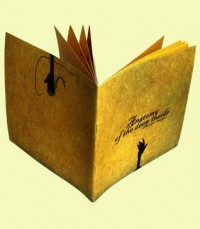 This book is best read in Kindle Cloud Reader simply because you need to be able to see it in color and with the pages side-by-side as written/drawn. I have to admit that I didn't understand it completely. Perhaps I'm not thinking deeply enough. Anyhow, I think that it's unfair for me to give it a rating because I don't think that I'm the right audience.
This book is best read in Kindle Cloud Reader simply because you need to be able to see it in color and with the pages side-by-side as written/drawn. I have to admit that I didn't understand it completely. Perhaps I'm not thinking deeply enough. Anyhow, I think that it's unfair for me to give it a rating because I don't think that I'm the right audience.
Beyond the Elastic Limit: An Epic Fable
 I honestly didn't know what to expect from this book with the author constantly promoting it in the Time Travel GoodReads group. And who the heck is Howard Loring anyway? The publisher's website explains that Howard isn't his real name and no amount of sleuthing (a small team effort) could bring more than 1 real hint that kind of fizzled before it got started. Plus, this Howard character is always making off-the-wall or philosophical tangents in our forums that had begun to make us wonder ... was this book going to be utter crap or it was going to be just as fabulous as he'd made it out to be? And was the book going to make any sense? As you can probably guess from the star rating, I ended up loving the book and all its twisty epic innards.
I honestly didn't know what to expect from this book with the author constantly promoting it in the Time Travel GoodReads group. And who the heck is Howard Loring anyway? The publisher's website explains that Howard isn't his real name and no amount of sleuthing (a small team effort) could bring more than 1 real hint that kind of fizzled before it got started. Plus, this Howard character is always making off-the-wall or philosophical tangents in our forums that had begun to make us wonder ... was this book going to be utter crap or it was going to be just as fabulous as he'd made it out to be? And was the book going to make any sense? As you can probably guess from the star rating, I ended up loving the book and all its twisty epic innards.The book is extremely well-told. And since the book is written out of order (much like a time traveler would view time), you find yourself with some light bulb moments when you realize that Person A from the beginning of the book is actually the person you've just been reading about. I liked that the characteristics of the characters were memorable enough that the "ah-ha" moments of realizing who was who wasn't too difficult despite their name changes. Reward your readers with ah-ha moments and you hook them quite well.
It's definitely an interesting book containing cavemen, a forest monster, time travelers, space ships, love triangles, gods, a beast, warring factions, holy water, people that don't appear to age, and an old hag ... among other things. And the book definitely is epic in proportion since the time travelers don't age during their travels into the past and since the story spans the galaxy.
I had a feeling that the "epic" ending would be an Adam & Eve scenario. It was set up too well for it to not end that way. I did like the twist of learning that Primus was a computer. That I didn't see coming. But I have to wonder why Primus felt the need to seed the universe with "grunts" unless it was the only logical way to keep an evolving population from eventually annihilating itself completely. I also am wondering what the purpose of the time machine in the story actually was. Yes, the people assigned to the station were supposed to view history and step in if needed, but what type of events would require such interference? Also, was the idea to bury the station and have new station masters come around thousands of years after the initial seeding to make the changes? Would equipment last for thousands of years without simply breaking down from time? Maybe I didn't understand the purpose of the station that housed the time machine in the first place. I think, though, that perhaps the other Epic Fable by Loring, [b:Piercing the Elastic Limit|13487848|Piercing the Elastic Limit|Howard Loring|http://d.gr-assets.com/books/1331741561s/13487848.jpg|19025345] might shed some insight on this since the author mysteriously won't give me a straight answer to my questions about the true purpose of the time machine.
So, yes, I've got to read Loring's other book ... and employ more identity sleuths ...
P.S. For anyone wanting to read this, don't buy the paperback version available on Amazon. Instead look for the version available on Smashwords since it's the edited version. Loring made quite a few revisions to tighten up the narrative after comments from some of his first readers, so be sure to get the newest edition if you're going to read it.
The Metamorphosis
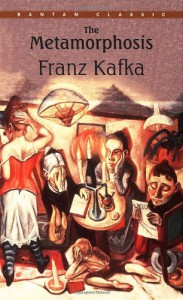 It just so happened that as I was listening to this book about a man who overnight turns into a beetle, that I was also cleaning and found a bucket full of stranded roaches. And do you know what I did with them? I drowned them in the bucket and threw them into the yard with only 2 seconds of thought of any sort of mercy. As much as I felt sorry for the metamorphosed Gregor in the story, my sympathy could not extend to dirty disease-carrying real bugs (may they rest in peace and such).
It just so happened that as I was listening to this book about a man who overnight turns into a beetle, that I was also cleaning and found a bucket full of stranded roaches. And do you know what I did with them? I drowned them in the bucket and threw them into the yard with only 2 seconds of thought of any sort of mercy. As much as I felt sorry for the metamorphosed Gregor in the story, my sympathy could not extend to dirty disease-carrying real bugs (may they rest in peace and such). There are 2 main observations that I have to make about the book. First of all, I found the family itself despicable for their complete reliance on Gregor previous to his metamorphosis. An able-bodied father and mother along with a young sister has depended completely on his job as a salesman to support them for the last 5 years after the father's business failure. And even though they live at home not working, they feel the need to have various servants to clean their small apartment and cook for them. Secondly, I suppose that Gregor's family loathing him after he turned into an insect is supposed to be a metaphor for a family's inability to accept a family member who has changed their religious, political, or social beliefs and behaviors from that of their family. Sadly, this happens and families sometimes are never able to accept the change in their formerly-loved one. I honestly have no sympathy for the family and their miseries. But it certainly is a warning to those who are not like their families to not expect acceptance but rather to expect more of an increased than decreased loathing. It's sad that this is often the case.
Anyhow, despite being a classic that emphasizes an ugly truth, I didn't find the book that interesting. It could have been all said in a much shorter story of 10 pages or so rather than its actual length.
Harvest
 Jim Crace always writes books that are a pleasure to read. They have a certain quiet lyrical quality to them that instantly make them feel like a classic. This particular book is very pastoral as the title suggests. But it's also a quiet horror story at its core. There are parts of this book that you turn over and over in your head, trying to make moral sense of them. And, in the end, you're not really sure if anything could have changed had different choices been made.
Jim Crace always writes books that are a pleasure to read. They have a certain quiet lyrical quality to them that instantly make them feel like a classic. This particular book is very pastoral as the title suggests. But it's also a quiet horror story at its core. There are parts of this book that you turn over and over in your head, trying to make moral sense of them. And, in the end, you're not really sure if anything could have changed had different choices been made. The story starts off in a happy village of serfs who serve a small manor house. The village is turned upside down in the course of a week when various newcomers arrive. The first stranger who comes to town seems to be making a map for the new lord of the manor to turn barley fields into sheep pastures. The second set of strangers who come to town get falsely blamed for the mischief of some local boys & thrown in stocks for 7 days. And a third set of strangers who come to town (the new lord of the manor and his minions) disrupt life and set up a witch hunt. All along the way it becomes more and more apparent that nothing good can come of any of this, and the reader is left anticipating what horror might be on the next page, especially when Mrs. Bedlam, the wife/daughter of the men in stocks, seems to flit unseen about the village like ghost bent on revenge.
At the heart of the story is the narrator who seems to be the only person who is a friend to all from the stocks to the serf village to manor house. And, as such, he should have the power to act as a peace-offering liaison between all the affected parties. However, time and again, he chooses the path of inaction rather than action. And time and again, the reader cringes to watch the results of his decisions to simply do nothing. He could have done X which would have prevented Y, but even so, it seems that Z was still the eventually inevitable consequence. Or was it? Could he have really prevented the various atrocities that befell the people around him? And how can he act so lackadaisical about the consequences of his inactions? And just when will he get his just deserts? Or is he as innocent as he seems to believe himself to be?
I couldn't help but imagine the vengeful "ghost", Mrs. Bedlam, as Helena Bonham Carter. And the ending of the book fittingly ended with me hearing the same spectacular ending song that plays in a particularly favorite nothing-good-can-come-of-all-of-this Bonham Carter movie: Where is My Mind by the Pixies. You've met me at a very strange time in my life indeed.
Silently and Very Fast
 For Elefsis, the most important verb is "to be". You might find this strange since Elefsis is a house. Silently and Very Fast is an odd, haunting, and beautiful tale of a house that has managed to live both inside and outside its occupants. Every part of this novella reads like a dream, but it's a dream that somehow seems like it's not too impossible in a future world where houses are computerized and where people are able to play video games in more of an inner-mind virtual reality setting. It's a tale that had to be written and it's a tale written in such a way as to make me a little sad that the worlds that I create in my mind are not nearly as magnificent as the worlds that this author creates in hers.
For Elefsis, the most important verb is "to be". You might find this strange since Elefsis is a house. Silently and Very Fast is an odd, haunting, and beautiful tale of a house that has managed to live both inside and outside its occupants. Every part of this novella reads like a dream, but it's a dream that somehow seems like it's not too impossible in a future world where houses are computerized and where people are able to play video games in more of an inner-mind virtual reality setting. It's a tale that had to be written and it's a tale written in such a way as to make me a little sad that the worlds that I create in my mind are not nearly as magnificent as the worlds that this author creates in hers.




